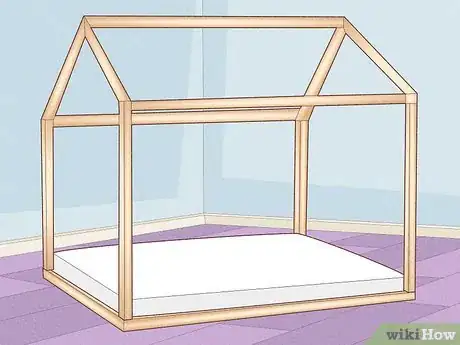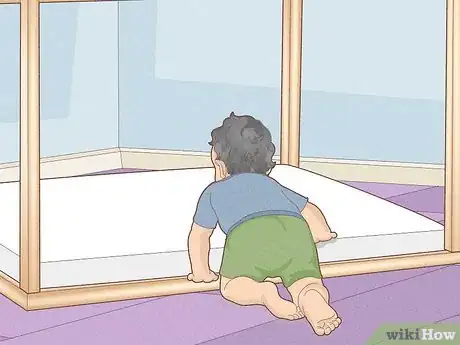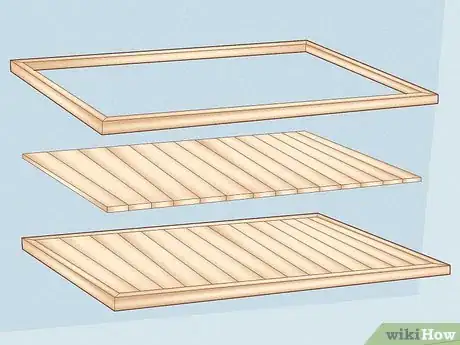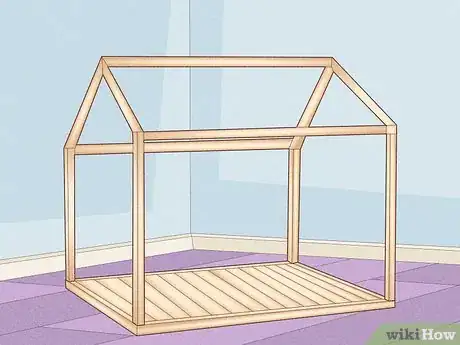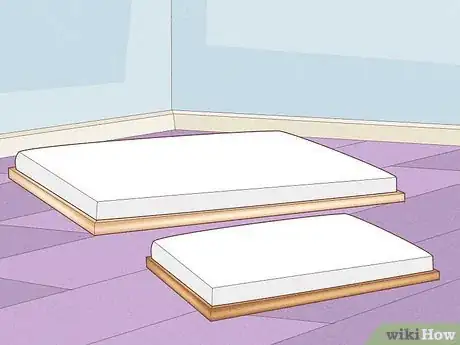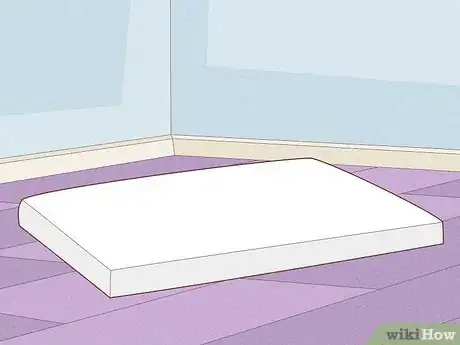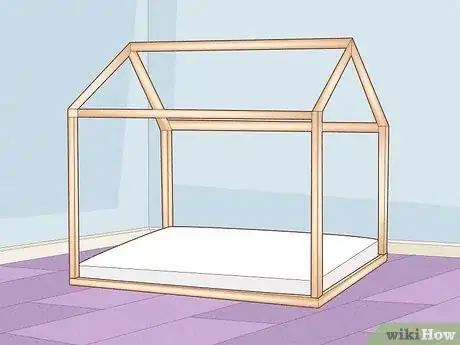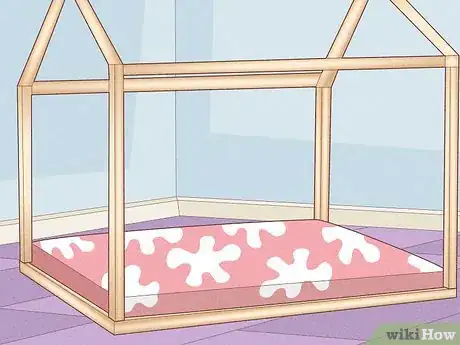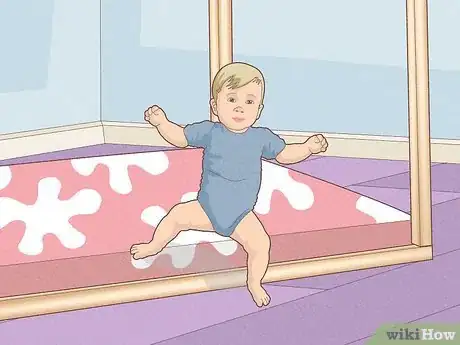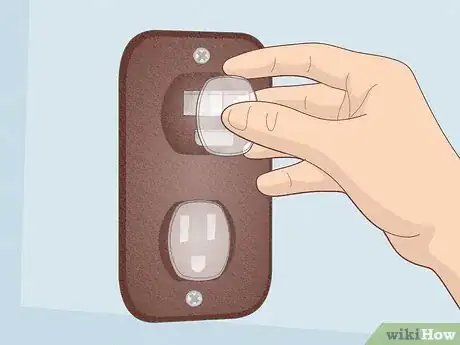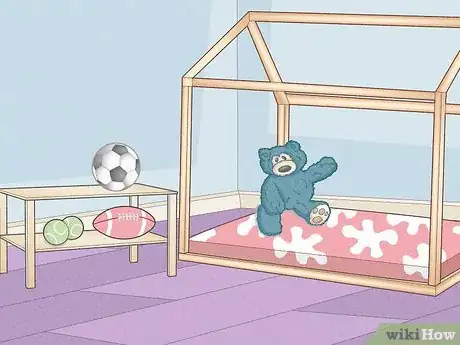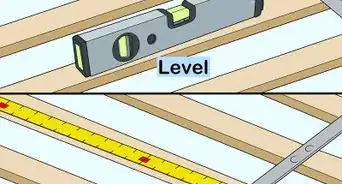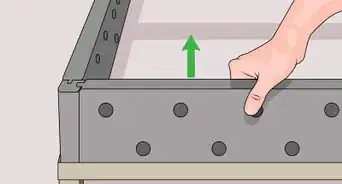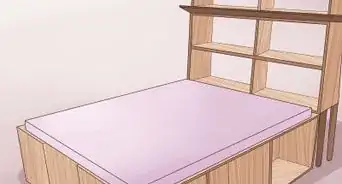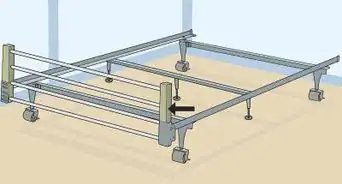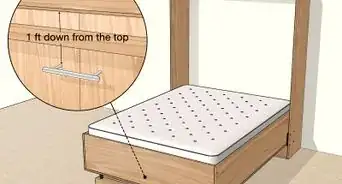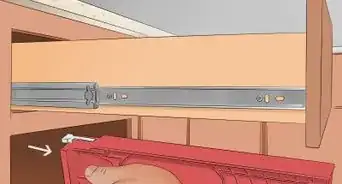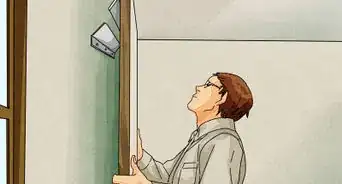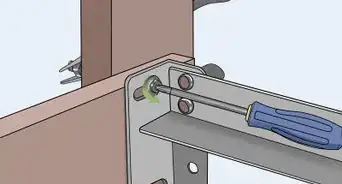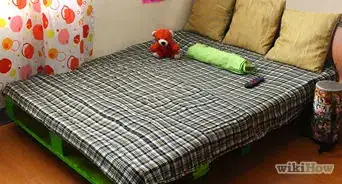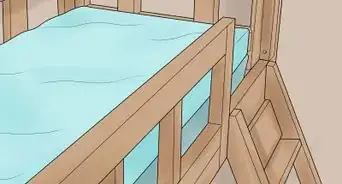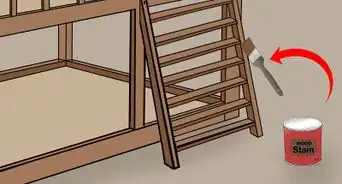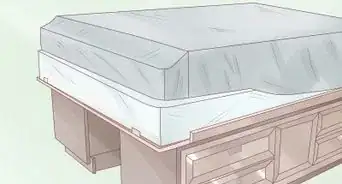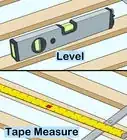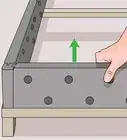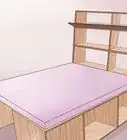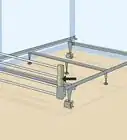This article was co-authored by wikiHow staff writer, Janice Tieperman. Janice is a professional and creative writer who has worked at wikiHow since 2019. With both a B.A. and M.A. in English from East Stroudsburg University, she has a passion for writing a wide variety of content for anyone and everyone. In her free time, you can find her working on a new crochet pattern, listening to true crime podcasts, or tackling a new creative writing project.
This article has been viewed 12,729 times.
Learn more...
A Montessori bed, or floor bed, embraces the Montessori educational philosophy of independence and accountability for children.[1] This type of bed can be an excellent addition to your young child’s bedroom, and offers them a lot of freedom to explore their surroundings. If you’re ready to make the switch, we’ve got you covered! Keep reading as we answer all your questions about your little one’s new sleeping arrangements.
Steps
How do you make a Montessori bed?
-
1Create a basic framework first. Get four 2 in (5.08 cm) by 3 in (7.62 cm) posts that are 36 in (91.44 cm) long and cut one end of each post to a 45-degree angle. Lay the posts on the floor with the angle ends facing away from each other, and put two 2 in (5.08 cm) by 4 in (10.16 cm) planks that are 52 in (132.08 cm) long between them. Secure the planks and posts together with wood screws and wood glue.[5]
-
2Build the base frame next. Separate the 2 frameworks that you just made so they’re 27 in (69 cm) apart. Then, grab two 2 (5.08 cm) by 4 in (10.16 cm) planks that are 27 in (68.58 cm) long. Secure the two 27 in (68.58 cm) planks between the framework with wood glue and wood screws, which creates a large, rectangular frame.[6]
-
3Finish the frame with extra planks and wood slats. Get three 2 in (5.08 cm) by 3 in (7.62 cm) planks that are 49 (124.46 cm) long. Place these planks vertically along the inner bed frame, with 2 planks flush with the left and right sides of the outer frame. Attach these planks with wood screws and wood glue. Then, nail fourteen 1 in (2.54 cm) by 4 in (10.16 cm) planks that are 27 in (68.58 cm) long on top of the wooden frame.[7]
How do I give my Montessori bed a roof?
-
1Create a roof with 4 pieces of angled wood. Set aside two 2 in (5.08 cm) by 3 in (7.62 cm) planks that are 22 ¾ in (55.79 cm) long, as well as two 2 in (5.08 cm) by 3 in (7.62 cm) planks that are 21 ¼ in (53.98 cm) long. Then, cut 1 end of every plank at a 45-degree angle. Place 1 short and 1 long plank on top of the back posts, layering them in an inverted V shape. Secure the planks in place with wood screws and glue, and then repeat the same process with the front 2 posts.[8]
-
2Install rails along the roof for extra support. Set aside two 47 in (119.38 cm) planks and secure them along both sides of the roof with wood glue and wood screws, directly beneath the inverted V-shape roof pieces. Then, secure a 2 in (5.08 cm) by 2 in (5.08 cm) plank that is 47 in (119.38 cm) long 2 by 2 in (5.1 by 5.1 cm) plank across the very top of the roof, connecting the pointed roof sections together.[9]
What type of mattress should I use?
-
1Choose a crib mattress if your baby is using the bed. Crib mattresses are super firm, and can protect against Sudden Infant Death Syndrome (SIDS). If your child is 1 year old or younger, definitely pick out a crib mattress instead of a standard one.[16]
- For toddlers and older babies, shop for any mattress that has a “firm” label or rating.
-
2Pick a firm, twin or full mattress if your toddler uses the bed. Shop for any mattresses with a “firm” label, so your little one can sleep safely and comfortably. You can pick out a twin or full mattress, as long as there’s enough space in your room.[17]
- You can share a Montessori bed with your child; however, wait until your child is out of the infant phase before you do this.
How can I make a Montessori bedroom for my child?
-
1Install accessible furniture. Add a 1-2 layer shelf along the floor of your child’s room. Arrange your little one’s favorite toys on these shelves, so your child can grab them easily. Be sure to secure these shelves to the wall, so they won’t tip over.[20]
- If your child is still crawling, hang up a mirror with a pull-up bar that they can easily reach. This can help them practice standing on their own, and eventually help them learn to walk.
-
2Display low-hanging art on the walls. Measure your child’s height, and figure out what qualifies as “eye-level” for them. Use these measurements to securely attach different pieces of art along the wall, so your child can admire them comfortably.[21]
- Check that the wall art pieces don’t have any sharp edges or pointy corners before hanging them up.
Expert Q&A
-
QuestionIs a Montessori bed a good idea?
 Bianca Solorzano, M.Ed.Bianca Solorzano is an Infant Development Specialist, Montessori Consultant, and the Founder of Baby Tour Guide Inc. Through her company, she helps parents, educators, and caregivers optimize baby and toddler development using a Montessori Lens. She does so by providing one-on-one consulting, running her blog, and hosting the Montessori Babies Podcast. With more than 11 years of experience in child development, she specializes in supporting parents in approaches such as purposeful language, environment setup, toys/activities that aid in development, positive redirection and behavior, and directed choice. Bianca holds a BS in Child and Adolescent Development with a focus in Early Childhood Education from California State University, Fullerton, a Masters in Montessori Education from Loyola University Maryland, and the AMI International Montessori Certification from The Montessori Institute of San Diego for children Birth-3 Years. Bianca is also a member of the National Association for the Education of Young Children (NAEYC).
Bianca Solorzano, M.Ed.Bianca Solorzano is an Infant Development Specialist, Montessori Consultant, and the Founder of Baby Tour Guide Inc. Through her company, she helps parents, educators, and caregivers optimize baby and toddler development using a Montessori Lens. She does so by providing one-on-one consulting, running her blog, and hosting the Montessori Babies Podcast. With more than 11 years of experience in child development, she specializes in supporting parents in approaches such as purposeful language, environment setup, toys/activities that aid in development, positive redirection and behavior, and directed choice. Bianca holds a BS in Child and Adolescent Development with a focus in Early Childhood Education from California State University, Fullerton, a Masters in Montessori Education from Loyola University Maryland, and the AMI International Montessori Certification from The Montessori Institute of San Diego for children Birth-3 Years. Bianca is also a member of the National Association for the Education of Young Children (NAEYC).
Infant Development & Montessori Consultant Sure it is, but don't stop there! A fundamental to Montessori in the home is following the child’s interest and inner will to learn. Do your best to set up their home environment to allow for independent learning — this can begin with offering simple, self-correcting toys, and involving them in developmentally appropriate ways in their day-to-day processes, including food preparation and cleaning, as much as possible.
Sure it is, but don't stop there! A fundamental to Montessori in the home is following the child’s interest and inner will to learn. Do your best to set up their home environment to allow for independent learning — this can begin with offering simple, self-correcting toys, and involving them in developmentally appropriate ways in their day-to-day processes, including food preparation and cleaning, as much as possible.
Warnings
- Check that there’s enough open space surrounding the bed, so air can flow freely around the mattress, frame and bedding. This way, mold isn’t as likely to form.[22]⧼thumbs_response⧽
References
- ↑ https://amshq.org/About-Montessori/What-Is-Montessori
- ↑ https://amshq.org/About-Montessori/What-Is-Montessori
- ↑ https://montikids.com/montessori/montessori-bedroom/
- ↑ https://www.familyeducation.com/sleeping-through-night/is-a-montessori-floor-bed-right-for-my-child
- ↑ https://www.thedesignconfidential.com/2015/08/free-diy-furniture-plans-how-to-build-toddler-house-bed/
- ↑ https://www.thedesignconfidential.com/2015/08/free-diy-furniture-plans-how-to-build-toddler-house-bed/
- ↑ https://www.thedesignconfidential.com/2015/08/free-diy-furniture-plans-how-to-build-toddler-house-bed/
- ↑ https://www.thedesignconfidential.com/2015/08/free-diy-furniture-plans-how-to-build-toddler-house-bed/
- ↑ https://www.thedesignconfidential.com/2015/08/free-diy-furniture-plans-how-to-build-toddler-house-bed/
- ↑ https://www.familyeducation.com/sleeping-through-night/is-a-montessori-floor-bed-right-for-my-child
- ↑ https://montessorirocks.org/sleep-tips-for-implementing-a-montessori-bedroom-for-your-baby-or-toddler/
- ↑ https://medium.com/@leadkid/montessori-sleep-training-bedroom-setup-495cc6cf65cb
- ↑ https://medium.com/@leadkid/montessori-sleep-training-bedroom-setup-495cc6cf65cb
- ↑ https://montikids.com/montessori/montessori-bedroom/
- ↑ https://www.familyeducation.com/sleeping-through-night/is-a-montessori-floor-bed-right-for-my-child
- ↑ https://www.familyeducation.com/sleeping-through-night/is-a-montessori-floor-bed-right-for-my-child
- ↑ https://www.familyeducation.com/sleeping-through-night/is-a-montessori-floor-bed-right-for-my-child
- ↑ https://www.familyeducation.com/sleeping-through-night/is-a-montessori-floor-bed-right-for-my-child
- ↑ https://www.familyeducation.com/sleeping-through-night/is-a-montessori-floor-bed-right-for-my-child
- ↑ https://medium.com/@leadkid/montessori-sleep-training-bedroom-setup-495cc6cf65cb
- ↑ https://medium.com/@leadkid/montessori-sleep-training-bedroom-setup-495cc6cf65cb
- ↑ https://www.familyeducation.com/sleeping-through-night/is-a-montessori-floor-bed-right-for-my-child
